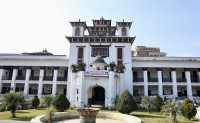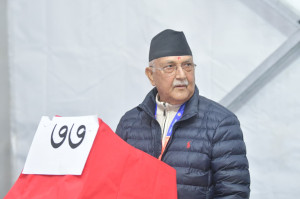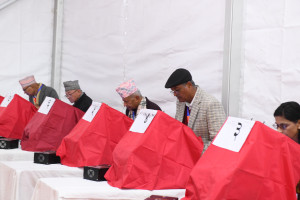Politics
China bars Humla residents from entering Tibet, prompting concern in Kathmandu
Chinese authorities on the border have cited murder of a Chinese woman by a Nepali last month
Anil Giri
A sudden decision by the Chinese authorities to bar locals in Humla from entering Tibet, which thousands of residents in the district rely on for their livelihood, has prompted the Ministry of Foreign Affairs to raise the issue with the Embassy of China in Kathmandu.
Over the past two weeks, Chinese authorities have sent back around 470 locals from the border, according to the District Administration Office in Simikot. But a government official posted in Humla told the Post over the phone that around 2,500 Humla locals who had already obtained passes to enter Tibet had to suffer because of the Chinese decision. The official, also posted in the same district, spoke on condition of anonymity because he said he was not allowed to give the “real” figures.
Officials told the Post that the Chinese authorities posted on Nepal-Tibet border confiscated passes issued to Nepalis to cross the border, citing the murder of a Chinese woman by a Nepali on the Chinese side three weeks ago.
Most of the Humla residents visit Taklakot, a Chinese town 30 kilometres from Hilsa for work and business purposes.
Until some years ago, a local from Humla used to earn up to Rs 2,000 per day.
With development gaining momentum on the Tibetan side, now a Humla resident can fetch up to Rs5,000 per day for labour job in Taklakot.
“This is a mistake on our part,” said Chhakka Bahadur Lama, a lawmaker from the district. “Nepalis are allowed to go to Tibet for work, not to indulge in criminal activities.”
The Chinese authorities issue one-year passes to people of Humla to go to Tibet where they either work or pursue businesses.
Mahesh Kumar Pokhrel, assistant chief district officer at the District Administration Office, Humla, confirmed to the Post that the Chinese authorities stopped Humla locals from entering Tibet after a Nepali killed a Chinese woman.
“We came to know about the incident only in the third week of May. The Chinese side communicated to our district police about the killing. They are investigating into the case,” said Pokhrel. “Since then, the Chinese authorities have stopped local residents from crossing the border and confiscated the border passes and sent them back. ”
After the situation became grave, chiefs and representatives of all six local bodies held an emergency meeting at the District Administrative Office and decided to request the federal government in Kathmandu to take up the matter with the Chinese side through diplomatic channels, as cross-border movement is associated with daily livelihood of the local residents, according to Pokhrel.
“The Tibetan authorities’ move has affected the working class, poor and labourers of the district,” Pokhrel added.
A Chinese embassy spokesperson in Kathmandu told the Post that they are checking the fact with authorities concerned in China.
“The Chinese Embassy in Nepal does not have specific information regarding the criminal activity committed by any Nepali national in China and the related incident as informed by the relevant authority on the Nepali side,” Ji Guanglli, spokesperson for the Chinese Embassy told the Post.
Since the Foreign Ministry raised the issue with the Chinese side late on Tuesday and because Wednesday was a public holiday, there was no further development, an official at the Foreign Ministry familiar with the communication told the Post on condition of anonymity because he was not allowed to speak with the media.
Humla locals are allowed to cross into Tibet as per a Nepal-China agreement on trade and payment. The Article VIII of the “Trade and Payments Agreement” between Nepal and China, signed in 1974, states that with a view to improving the economic life of the border inhabitants, the two contracting parties agree that the border inhabitants of the two countries, may, within area of 30 kilometres from the border, can do traditional trade on barter basis, which shall not be subjected to the limitation of the stated provisions.




 16.12°C Kathmandu
16.12°C Kathmandu













%20(1).jpg&w=300&height=200)

